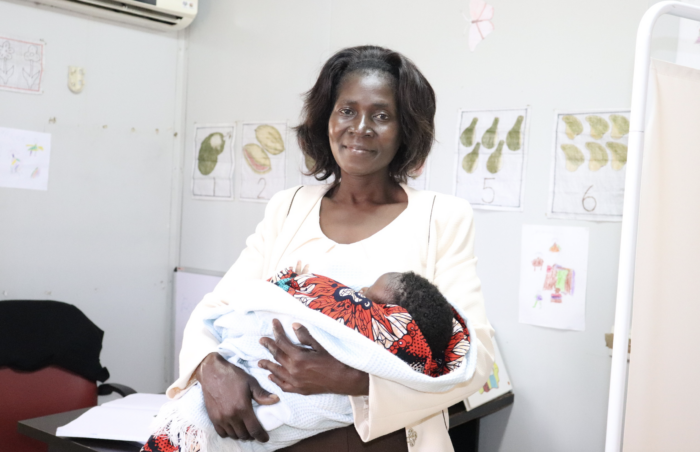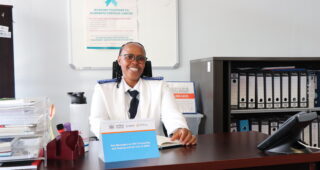From One Mother to the Next: Márcia and the Mentor Mothers of Gaza
 Márcia Manhique is a 43-year-old, married mother of three living in the city of Xai-Xai in Gaza, Mozambique. Xai-Xai is the city with the highest rate of people living with HIV in the country, and Gaza as a province has an HIV prevalence rate of nearly 25%, making it a major focus for the Elizabeth Glaser Pediatric AIDS Foundation (EGPAF).
Márcia Manhique is a 43-year-old, married mother of three living in the city of Xai-Xai in Gaza, Mozambique. Xai-Xai is the city with the highest rate of people living with HIV in the country, and Gaza as a province has an HIV prevalence rate of nearly 25%, making it a major focus for the Elizabeth Glaser Pediatric AIDS Foundation (EGPAF).
We found Márcia at the City Health Center, where she took her 1-month-old daughter for an HIV test to ensure she did not acquire HIV through birth and breastfeeding from Márcia, who receives antiretroviral treatment (ART) at the facility. To Márcia’s delight, her child tested negative.
“We are healthy, and I feel happy about that. I conceived my third child with an undetectable viral load, and when I gave birth, it was also undetectable,” says Márcia with a smile. Her husband and all three children are HIV-free.
Despite her current happiness, her life has been very difficult for the past seven years.
In 2016, Márcia tested positive for HIV at the prenatal consultation for her second child. Márcia did not believe the result. Based on her knowledge of HIV, she did not believe it was possible for someone like her to get HIV—and she felt relatively healthy. Márcia refused to adhere to ART and just continued her normal life. But a few months later, she became ill and was admitted to the provincial Hospital. Even then, she still thought that the doctors were lying about her health. Despite receiving malaria treatments, many symptoms never went away.
Márcia’s health became a chronic struggle, but with the support of a mentor mother (another woman living with HIV), her understanding of HIV grew, the stigma she held receded, and her attitudes around her own health status began to change.
“When the mentor mother arrived at my house, I didn’t want to see her because I didn’t believe I had HIV. I never thought the virus would hit me; I thought it happens to others,” says Márcia. “After a lot of insistence, I decided to adhere to the treatment, and today I have no regrets. My second child was born healthy, and everything is going well.”
The mentor mother group is an EGPAF initiative implemented through the ALCANÇAR project funded by the U.S. President’s Emergency Plan for AIDS Relief (PEPFAR) through the U.S. Centers for Disease Control and Prevention (CDC).
To ensure the access and retention of HIV patients, the group of mentor mothers at the Xai-Xai Health Center has 22 volunteers who sensitize people and travel through the communities, monitoring their assigned patients, searching for missed cases, and connecting with absent patients to support them to return to treatment. At the health facility, they lead lectures on HIV, family planning, gender-based violence, and malnutrition.
“We are healthy, and I feel happy about that. I conceived my third child with an undetectable viral load, and when I gave birth, it was also undetectable,”
They also welcome pregnant women and explain the services offered. They then follow up according to specific needs, including viral load collection; postpartum consultation; family planning; and infant care, such as the HIV test Márcia was seeking for her child.
“I was only able to overcome my illness with the care from the mentor mothers of EGPAF, who accompany me daily,” Márcia says. “At first, I had difficulties to accept their support, but now we have become friends, and I even call them when they go many days without coming to visit me. The work they do is commendable because it helps to save lives like happened with me and my two children who would be born with HIV, but that didn’t happen.”
In Mozambique, the rate of mother-to-child HIV transmission declined from 28% in 2010 to 14% in 2019. However, the nation is struggling to reach the target of 5% Adolescent girls and young women continue to be the groups most affected by the epidemic, which is a key driver of transmission to children.
“I recommend other mothers in the world with a similar story to mine take treatment, and keep our appointments at the health center to see if the treatment is working,”
Other vulnerable populations (such as orphans and those facing extreme poverty) and key populations (such as men who have sex with men and those engaged in transactional sex) have been hard to reach with HIV testing and treatment. In 2019, approximately 51,000 Mozambicans died from AIDS-related causes, of which: 42,400 (84%) people were older than 15 and 8,100 (16%) were children younger than 14 years old.1
To combat this massive challenge and divert preventable deaths, Mozambique has one of the largest HIV treatment programs in the world, with 1.4 million people undergoing treatment as of December 2020. The work of mentor mothers has been crucial in preventing and fighting stigma, facilitating psychosocial support networks for people living with tuberculosis or HIV, and allowing other mothers to share their life experiences and support each other to overcome the challenges that the disease imposes.
“I recommend other mothers in the world with a similar story to mine take treatment, and keep our appointments at the health center to see if the treatment is working,” Márcia says.
“A pill a day helps us a lot because we don’t feel dizzy like before. I, for example, take it in the morning and go to work in my farmhouse without complaints, and I’m still strong enough to raise and educate my three children.”
Felix Filipe
Mozambique
Maternal & Child Health; Prevention of Mother-to-Child Transmission



